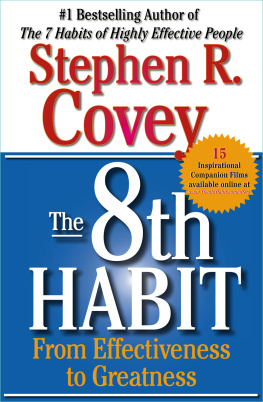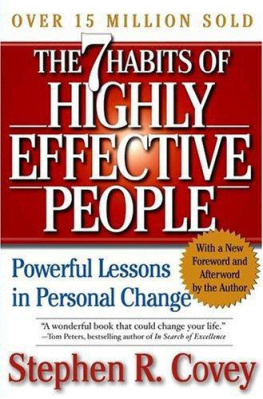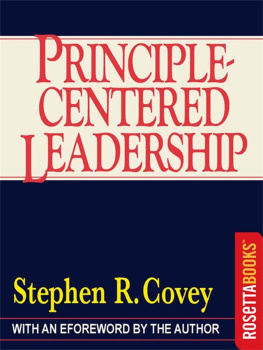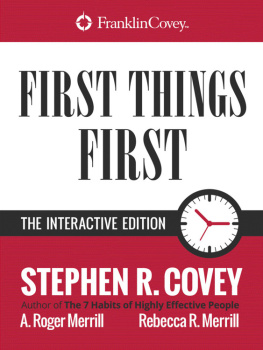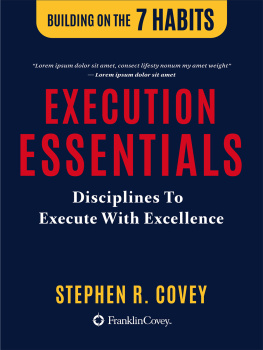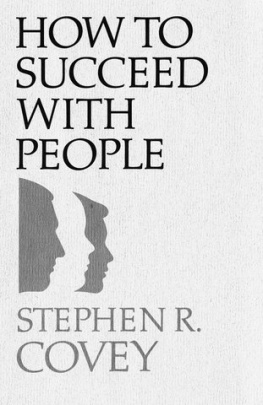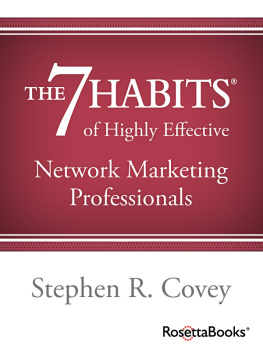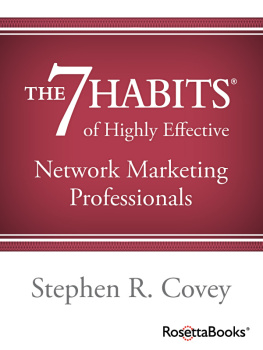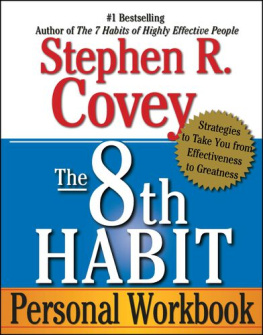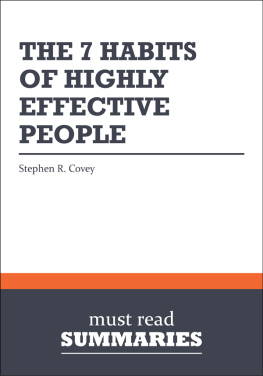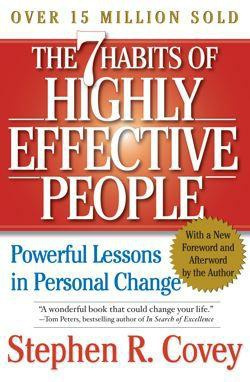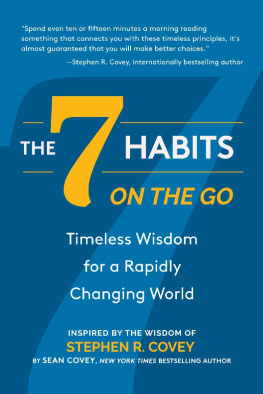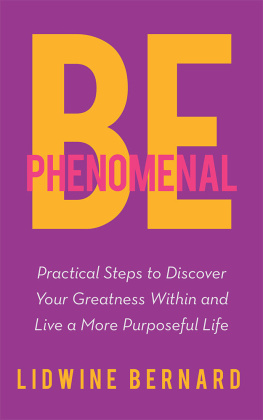II
12 LEVERS OF SUCCESS

Thank you for downloading this Simon & Schuster eBook.
Join our mailing list and get updates on new releases, deals, bonus content and other great books from Simon & Schuster.
C LICK H ERE T O S IGN U P
or visit us online to sign up at
eBookNews.SimonandSchuster.com
We hope you enjoyed reading this Simon & Schuster eBook.
Join our mailing list and get updates on new releases, deals, bonus content and other great books from Simon & Schuster.
C LICK H ERE T O S IGN U P
or visit us online to sign up at
eBookNews.SimonandSchuster.com

Simon & Schuster
1230 Avenue of the Americas
New York, NY 10020
www.SimonandSchuster.com
Copyright 2015 by Franklin Covey Co.
All rights reserved, including the right to reproduce this book or portions thereof in any form whatsoever. For information, address Simon & Schuster Subsidiary Rights Department,
1230 Avenue of the Americas, New York, NY 10020.
First Simon & Schuster hardcover edition November 2015
SIMON & SCHUSTER and colophon are registered trademarks of Simon & Schuster, Inc.
For information about special discounts for bulk purchases, please contact Simon & Schuster Special Sales at 1-866-506-1949 or .
The Simon & Schuster Speakers Bureau can bring authors to your live event. For more information or to book an event, contact the Simon & Schuster Speakers Bureau at 1-866-248-3049 or visit our website at www.simonspeakers.com.
Interior design by Claudia Martinez
Jacket design by Eric Fuentecilla
Library of Congress Cataloging-in-Publication Data is available.
ISBN 978-1-5011-0657-6
ISBN 978-1-5011-0695-8 (ebook)
CONTENTS
FOREWORD BY SEAN COVEY
As a young man, my father, Stephen R. Covey, had a job lined up. His father owned a successful hotel chain, and as the oldest son he was set to take over the business.
But a stint as a teacher infected him with a desire to use his talents elsewhere. His own voicea combination of passion, talent, and consciencecried out to be heard. He decided he wanted to be a teacher above all else. He had sensed the wondrous potential of his students and burned with a desire to unleash that potential. But he knew his father wanted him to take over the family business. He decided to talk with his father, but he was so afraid of what his father might think.
One day he approached his father and told him he wanted to be a teacher. His father replied, Thats fine, son. Youll be a great teacher. To be honest, I never liked business that much myself. So Dr. Covey went on to become a university professor, a writer, and ultimately one of the worlds most sought-after thought leaders on the topics of leadership, organizational effectiveness, and family, all because he had the courage to find his own voice and make a distinctive contribution.
He helped others find their voice too. On one occasion I asked my father what he thought a good definition of leadership was. He said, Leadership is communicating to another person their worth and potential so clearly they are inspired to see it in themselves. This was the first time Id ever heard such a definition, and I teared up a little. Why? Because that definition personified him. He was always communicating to me my worth and potential, even when I didnt see it in myself. He made me feel like I could do anything and that I had an important mission to fulfill. He did the same for my brothers and sisters and basically to everyone around him. He believed that every single human had a unique purpose to fulfill and that each of us was of infinite worth and potential, not to be compared to anyone else.
He was a great teacher, first by his example, and then by his words, and I was deeply influenced by his insights. One of the fundamental things he continually taught me is that there are two ways to live: a life of primary greatness or a life of secondary greatness. Primary greatness is who you really areyour character, your integrity, your deepest motives and desires. Secondary greatness is popularity, title, position, fame, fortune, and honors. He taught me not to worry about secondary greatness and to focus on primary greatness. He also noted that secondary greatness would oftenbut not alwaysfollow those who achieve primary greatness, and that primary greatness had its own intrinsic rewards, such as peace of mind, contribution, and rich and rewarding relationships. These rewards far outweigh the extrinsic rewards of secondary greatnessmoney, popularity, and the self-absorbed, pleasure-ridden life that we too often consider success.
This book is a collection of several of my fathers best essays that have never appeared in book form before and arent well known. But they are vintage Stephen Covey and contain some of his best thinking. So, my colleagues and I thought it only appropriate to share them with the world. At the writing of this foreword, it has been three years since my father died. But in these essays you will hear his insightful and penetrating voice speaking to your core. These essays are virtually untouched from when he first wrote them. We have simply woven them into a narrative about living a life of primary greatness. My father wrote some of these while he was formulating The 7 Habits of Highly Effective People, and its exciting to see in these articles the genesis of ideas that have since transformed the world of business and many millions of lives. But this is not The 7 Habits all over again. This book contains refreshing insights about moving from a life absorbed with the external trappings of success to a life of deep peace, satisfaction, and wisdom.
Many people are hurting. They have chronic life problems, dissatisfactions, and disappointments. Theres a lot of discouragement, and much of what is passed off as a cure for these ailments is just superficial. This book can give you real healing in a world of aspirin and bandages. Ive faced some wrenching tests in my own life, and I can tell you from personal experience that the principles I learned from my fatherprinciples clearly taught in this bookhave given my family and me the courage and the confidence to move forward, make a contribution, and find happiness. Those principles will do the same for you.
PREFACE
PRIMARY VS. SECONDARY GREATNESS
There were 614 wooden deck chairs on the Titanic when it put to sea for its first and last voyage. Every morning the crew would untie the chairs and arrange them attractively so the passengers could lounge on the deck. Passengers could arrange them any way they liked.
Presumably, no one was actually rearranging the deck chairs as the great Titanic sank.
But rearranging deck chairs on the Titanic is now shorthand for doing pointless or trivial things instead of the important things in life.
Rearranging deck chairs while the ship is sinking is literally the last thing youd do.
Then why is it the first thing so many of us do?
To rearrange deck chairs is to put appearances before reality, to care more about image than substance, to have your priorities backward.
And thats what we do. We put last things first.


